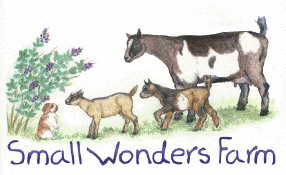
Caring
For Nigerian Dwarf
Goats
(And Other Miniature
Dairy Goats)
General Information
Taking care of goats is a major responsibility. Goat-keeping is a 365-day a year job. You cannot just say "I don't feel like taking care of the goats today." Sometimes you can delegate the responsibilities of taking care of the goats to a qualified individual, you can't just get some goats, put them in a field, and expect them to be okay.
You should keep at least two goats. A single goat will tend to be lonely and call for companionship. Two wethers (neutered male goats), two does or a doe and wether make a great starter herd. A buck (intact male goat) does not make as good a pet as a wether or doe. They develop a strong odor and the rude habit (to human's anyway) of urinating on themselves and anyone standing too close. Nigerian dwarf goats, both bucks and does, become fertile as young as 12 weeks of age. Young bucks should be separated from does of any age at that time or be neutered.
Proper Shelter
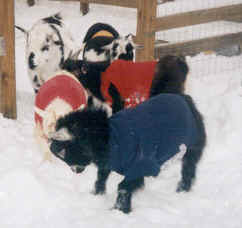 Nigerians
need considerably
less space than
larger goats. A nice
setup for a couple
of goats is a large
chain-link dog run.
They can be kept in
pens designed for
larger livestock as
long as the fence
mesh is small enough
that they cannot
squeeze out. A five
foot fence is
recommended to deter
dogs and other
predators. It is
very important to
ensure that dogs and
other wild animals
cannot get into the
goat pen. Goats
should have a
shelter that offers
protection from
drafts (strong wind
currents) and rain.
This can be very
simple. Wooden or
plastic doghouses
will do for a couple
of goats. An ideal
goat home is not
air-tight, goats
need fresh air. In
most climates a deep
three sided shelter
is a perfect goat
house. A thick layer
of bedding, such as
straw or shavings,
is desirable in the
shelter.
Nigerians
need considerably
less space than
larger goats. A nice
setup for a couple
of goats is a large
chain-link dog run.
They can be kept in
pens designed for
larger livestock as
long as the fence
mesh is small enough
that they cannot
squeeze out. A five
foot fence is
recommended to deter
dogs and other
predators. It is
very important to
ensure that dogs and
other wild animals
cannot get into the
goat pen. Goats
should have a
shelter that offers
protection from
drafts (strong wind
currents) and rain.
This can be very
simple. Wooden or
plastic doghouses
will do for a couple
of goats. An ideal
goat home is not
air-tight, goats
need fresh air. In
most climates a deep
three sided shelter
is a perfect goat
house. A thick layer
of bedding, such as
straw or shavings,
is desirable in the
shelter.
Many goats are kept on "dry lots" (otherwise known as bare dirt!), as few people have access to a real pasture. To help keep the goats comfortable and keep parasites and odors down, some simple steps can be taken. Sprinkle the bare ground with livestock-grade lime or, even better, Sweet PDZ (an odor-neutralizing and absorbent product found at most feed stores.) A layer of bedding over the dirt, such as straw or old hay, helps keep the goats comfortable so long as it stays reasonably dry. This can be raked out when it accumulates and used as great compost! Otherwise clean bare dirt or grass is preferable.
During warm months, flies may bother goats. Most fly traps are ecologically acceptable. However, they are useless unless an effort is made toward cleanliness in the goat home and pen.
Feeding Your Goats
Goats
are ruminants. This
means that bacteria,
not acid, in their
digestive systems-
their rumens- break
down compounds
in plant material
that the goat
otherwise could not
digest. The
rumen is like a
large fermentation
vat. These bacteria
produce all of the B
vitamins and
vitamin C, thus
goats do not require
these in their
diet. But it
is important to keep
those rumen bugs
happy and in
balance. You
should avoid sudden
diet changes.
Change feed and hay
types and amounts
gradually over a
week' time.
Limit treats to a
few, not as much as
the goat
wants. And
limit access to lush
green grass or
browse until the
goats have a chance
to adjust.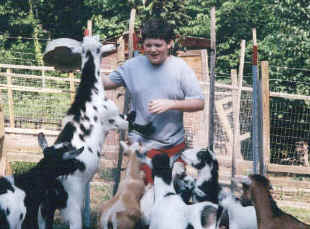
The primary diet for most goats should be good-quality grass hay. I use orchard grass hay. NEVER feed hay or grain that is moldy. It is important to ensure that goats do not bloat if they are given fresh, newly cut green hay. The hay should be sweet smelling, soft and green, free from mold and as free from dust as possible. It should be fed free-choice. A hay rack should be provided that is designed in such a manner that the hay will be kept off the ground, and designed to keep the goat kids from climbing into it. Hay should be stored so that it does not touch the ground or get rained on. Pallets, plastic, or wood can be used to protect it from the ground. Hay that is left close to the ground for long periods of time is likely to become moldy.
Wethers, bucks not being used for breeding, and dry (non-pregnant) does may not need as grain as does in late pregnancy and milking does. Goats should be fed a grain ration formulated for goats. The grain should be kept in rodent-proof containers, such as in metal trash cans with tight fitting lids. Make sure to keep your grain where your goats can't get access to it if they get out of their pen. Overeating grain can be quickly fatal.
Your goats will also really enjoy some time to browse, if you are able to let them do so. You can also supply them with fresh branches from non-poisonous trees, non-poisonous weeds such as dandelions, and garden leftovers. Do not be surprised if your goats are picky eaters! As browsers, goats prefer trees and bushes to grass.
Clean water is essential, goats will not drink dirty water, or from a dirty bucket. Refresh their water at least once daily. Adequate water intake is vital to the urinary tract health of male goats, particularly wethers, and necessary to the proper functioning of a goat's rumen. A bucket of warm (nearly hot) water in the winter is a nice treat and encourages adequate water intake.
Goats should have baking soda and loose (powdered) minerals available. A mineral block such as one for cows and horses is not suitable as a goat's tongue is too small to lick enough to be of any benefit. Your feed bag may describe what type of minerals should used with that feed. You can also contact your veterinarian or agricultural extension agent for recommendations for a mineral mix for your area. The type will also depend on the hay that they are eating. All animals require a balanced ratio of calcium and phosphorus, two very important minerals, to fully utilize both minerals. Goats should have a ratio of about 1.5-2 parts calcium for each part of phosphorus. Grass hays tend to be somewhat low in calcium and phosphorus, while alfalfa has about five times as much calcium as phosphorus! Mineral imbalances can lead to urinary tract stones, especially in wethers.
For goats on grass hay, there are many mineral supplements that can be used. Many companies make supplements especially for goats- Sweetlix, Golden Blend and Caprine Supply are some examples. Most feed stores do not carry a supplement just for goats. Purina 12-12 horse minerals are used by many goat owners. If you do use horse minerals, you may not want to feed them free-choice. Some have alot of flavorings in them to make them more palatable to fussy horses. But they are like candy to goats. These types can be top dressed on the goat's grain ration or offered in limited amounts daily. Follow label directions on the mineral as to whether to offer salt as well as minerals. Most mineral mixes are complete, but some, like Purina 12-12, do ask that salt be offered as well. Loose salt works better than salt blocks for goats. Never use sheep (or sheep and goat) mineral supplements for goats. The amount of copper needed in a goat's diet will kill a sheep, so a mix that is safe for sheep does not have enough copper for goats.
It is also a good idea to offer free-choice baking soda to your goats. Excess acidity in the rumen can cause beneficial bacteria to die, resulting in a very sick goat. Baking soda can help prevent this. Do not offer baking soda to wethers, especially those getting ammonium chloride in their diet to prevent urinary stones.
Most feeds formulated for goats have ammonium chloride added to acidify the goat's urine. This is helpful in preventing urinary stones (calculi) in all male goats. Check to be sure yours has this ingredient. It is also available from goat supply companies to be added to the goats drinking water or top dressed on their feed.
Some areas of the country are "selenium-deficient." Selenium is a mineral found in the earth. Goats, especially pregnant does and kids, in selenium-deficient areas of the country may require a mineral supplement higher in selenium to prevent the occurrence of white muscle disease, a potentially fatal condition.
Keeping Your Goats Healthy
Goats are healthy, hardy animals when cared for properly. But, even the best cared for of animals can fall ill or get injured. This is one of the many reasons why a goat owner must develop a working relationship with a large-animal veterinarian before the goat herd exhibits symptoms of illness. A new goat owner should locate a veterinarian who will treat goats. Many practices are limited to the care of cats and dogs, or even just horses. Medicine for these animals is much different than for ruminants, such as cows, sheep and goats. Some veterinarians who treat large ruminants such as cows will also treat goats. Ask the breeder who they use or call The American Association of Equine Practitioners. They will refer callers to vets who are large ruminant specialists. Call 1-800-GET-A-DVM for a referral.
Goats need to be treated regularly for internal parasites (worms). Your veterinarian, agricultural extension agent, or the goat breeder may be able to help you tailor a deworming program that will work in your area. Your goats needs will vary depending on the area of the country you live in, the number of goats you own and the age and breeding status of the goats. Some wormers have become ineffective in certain areas. Rotational worming, changing types of wormers every time you worm, has now been proven to cause resistance. The current method of treatment is to use only one type until the worms develop a resistance, before switching types of wormer. The best way to tell whether your program is working is to do regular fecal checks. It is very easy to learn to do your own. Several websites have instructions and many goat supply companies sell test kits.
Goats require annual vaccinations to prevent enterotoxemia (overeating disease) and tetanus. The vaccine is usually called CDT vaccine. These injections are simple to give. If you wish to learn to give your own vaccines ask you veterinarian to show you how. This is also a very useful skill to have as most goat medications, particularly antibiotics, are only given as injections. Goat do not tolerate oral antibiotics well as they kill off the necessary bacteria in the rumen. CDT vaccine is available through mail order from livestock supply companies, or from your local feed store.
Grooming requirements for goats are fairly simple. The most important aspect of grooming is hoof trimming, which should be done every 6 to 8 weeks. This is a simple and quick chore, if you keep up with it. Have the breeder or your vet show you how. The FiasCo Farms website has an excellent article with great pictures on Hoof trimming. You can find a link to their site below.
Many breeders shave their goats in the spring. This helps keep the goats cool and free of parasites in the summer. If your goats develop a lot of fluffy undercoat (This is cashmere!) you can comb it out as they shed it in the spring. Goats hate water, and luckily seldom need bathing! Unless you are going to a show, your goats shouldn't need baths. Watch for excessive scratching and rubbing. This could indicate an infestation of lice. Donít panic! Lice are species specific, meaning that the lice that get on goats can not live on humans. Sevin dust, diatomaceous earth, CoRal livestock powder and any flea and tick powder for dogs and cats will quickly remedy the situation. Treat then repeat in ten days to get any newly hatched out lice. The use of ivermectin type wormers will also help control lice.
How can I tell if my goat is sick?
Go with your instincts here. If the goat just doesnít look or act right, investigate! Check to see if the goat is injured or in pain, take the goats temperature and observe its breathing. Check the goatís gums or inner eyelid to see if they are healthy and pink. Check to see if the stomach is bloated or tight. Donít hesitate to call an experienced goat person, such as the breeder who sold you the goats, or your veterinarian for a telephone consultation. They will probably ask about the symptoms and signs as listed above to help you diagnose the problem and give a recommendation. There are several signs to watch for that indicate a sick goat, besides looking "down" or "not right":
-
Listlessness
-
Temperature over 104 degrees (a rectal thermometer is a must have for goat owners)
-
Grinding teeth (sounds like they are chewing rocks)
-
Not chewing cud
-
Refusing food and/or water
-
Appearing bloated
For specific illnesses check out the Articles Page on the GoatWorld Site, and the Articles page on the Onion Creek Site. You will find links on my FYI Page. Of particular interest please look at the articles relating to CAE (Caprine Arthritis-Encephalitis Virus), Johneís disease, CL (Caseous Lymphadenitis), Bloat, Polioencephalomalacia (Goat Polio), Listeriosis, Coccidiosis and Soremouth.
Breeding
Goats come into heat for 12 to 36 hours every 18 to 21 days. Unlike larger dairy breeds that only cycle from fall to early winter, Nigerian Dwarves cycle year round. The heat cycle is characterized by uneasiness, riding other animals, wagging the tail ("flagging"), bleating, vulvar swelling and a clear to whitish vaginal discharge. After breeding, the gestation period (time from pregnancy until birth) is approximately 150 days. Nigerian dwarf goats can become fertile as early as 12 weeks old. Care should be taken to keep the sexes apart to avoid accidental mating.
Goats should not be bred until they are about 7 to 12 months old or when they reach about ĺ of their adult size and weight. Earlier breeding can stunt the growth of both the fetus and the pregnant doe and puts the doe at greater risk of birthing complications from being too small to pass the fetus. Goats generally have two offspring. But litters up to 5 are not that uncommon. Many Nigerian Dwarf Goat owners wait until the doe is at least a year old but less than two years old before breeding her for the first time to allow these small goats to reach a size that makes it safer to kid.
There
are conditions that
can affect the
health of pregnant
and newly kidded
does. These are
Pregnancy Toxemia,
and Milk Fever.
Please check out the
articles on The
GoatWorld Website,
And FiasCo Farms
website for specific
symptoms and
preventative
measures against
these conditions.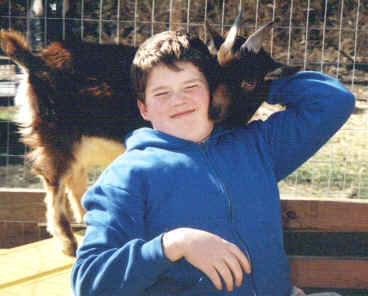
Goat keeping is a fun and rewarding hobby. It is also an ongoing learning experience. This is just a brief overview to help you learn to care for your goats. Below are some sites where you can find more in depth information and answers to specific questions. Feel free to email me too, maybe I can help!
Fun Sites to Visit:
Watkins'Products&Recipes! Use Associate #357294!
The Herbal Arbor
Wonderful goats milk
soaps and skin
products
Meadow
Dance Farm
Llamas make great
livestock guardians,
go here to meet some
great ones!
Informative Sites:
FiasCo
Farms This one
has good articles
with lots of clear
photos
Saanendoah
This one has great
articles,
particularly on
medications, wormers
and cheesemaking
GoatWorld
This is one big
site! A
comprehensive
library from all
over the web with
clear easy to
understand articles
covering nearly
every aspect of goat
keeping, great plans
for stanctions,
feeders, mineral
feeders and a link
to Goat911, online
help for people with
sick goats.
Onion
Creek Ranch
This one has well
written articles on
goat care.
Nigerian Dwarf Goat
Association
American
Goat Society
Miniature
Dairy Goat
Association
Goat Supplies:
Register's
Sheep and Goat
Supplies
Jeffers Livestock
Supply
Hoegger
Goat Supply
Caprine
Supply
Fellow Goat Breeders:
Maggidan's
Minis
Registered Pygmy
Goats
Foxcroft
Nigerian Dwarf Goats

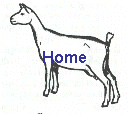
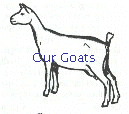
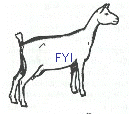
 This
site designed and
maintained by:
This
site designed and
maintained by: